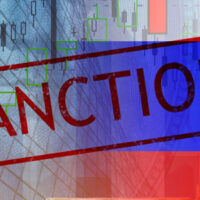
An unprecedented confluence of crises has transformed the financial crime and risk landscape, turning the screws on the compliance efforts of financial institutions (FIs). Circumstances such as the ongoing Russia-Ukraine conflict, resulting spikes in geopolitical tensions between the West and Russia and China, in addition to a teetering U.S. economy plagued by stubborn inflation, have presented unforeseen challenges to leaders that call for the fortification of compliance controls and crime prevention strategies. The ongoing volatility, on both a geopolitical and economic front, has made it an even greater necessity for FIs to abandon old assumptions and take a fresh assessment of compliance processes and know your customer (KYC) controls.
Widening U.S. Sanctions on Russia Produce Complex Compliance Challenges
Last year saw Russia invade Ukraine and upend the geopolitical status quo. Since then, U.S. sanctions have been placed on over 80% of Russia’s banking sector by assets, which include the top 10 Russian-owned banks.1 The U.S. announced this February that it is now leveling new sanctions on over 200 Russian and third-country individuals and entities, boosting the already staggering scope of 2022’s sanctions. Further, the U.S. released a compliance note2 in early March advising how FIs should detect sanctions and export control evasions and detailing how it is zeroing in on those using third‐party intermediaries or transshipment points to bypass restrictions and obscure the Russian end users’ true identities to evade sanctions. Doing business with sanctioned parties—whether knowingly or unknowingly—now has far wider implications for everyone who worked with the sanctioned individuals and companies, including those who are seemingly degrees removed from the sanctioned list.
It is worth noting that previously, the sanctions list or the Specially Designated Nationals and Blocked Persons list of the Office of Foreign Assets Control (OFAC) tended to include people who did not have bank accounts or financial relationships onshore in the U.S. This led to sanctions screenings dismissing people as being false positives—individuals with the same name but a different birth date or other slight differences. But now, numerous Russian individuals and corporations on those sanction lists do have bank accounts in the U.S. This causes a huge ripple effect within the banking industry because now banks not only have to identify these individuals, but once identified, they also have to block accounts, make reports and keep regular reviews on those accounts. This means that the KYC burden on banks has only increased within the past year.
Additional Volatility in Commodity Prices Means More Crime
In addition to an ever-evolving and increasing list of sanctioned companies, individuals and institutions, the Russia-Ukraine conflict has also led to record-breaking commodity prices of grain and energy, the likes of which can have an indirect impact on raising the rate of financial crime. High prices of commodities attract bad actors who flock to reap higher margins through nefarious means. Although these prices have fallen as of late last year, they still have lingering effects today. Sanctioned parties who need money, like the Russian government, will aim to evade sanctions by selling petrochemicals and gas at a discount to the rest of the world, and this creates another opportunity for nefarious actors to do things like falsifying letters of credit and falsifying transportation methods. Volatility breeds crime, whether it stems from rising prices or plummeting prices. This illegal activity needs to be checked wholly and fully through the Western financial system.
Economic Turmoil Presents a Compliance Conundrum
The combined impact of the COVID-19 pandemic as well as the Russian invasion of Ukraine have led to unprecedented volatility across the global economy over the past few years. In particular, the U.S. has had unprecedented events over the past few years that have led to soaring inflation and subsequent raising of interest rates by the Federal Reserve. That, however, has now led to further turmoil in the banking industry, with this March’s bank failures jittering markets, sending mortgage rates lower and leaving people, trusts and companies without banking services—or rapidly switching banking services.
As a result, banks now find themselves needing to verify a large number of applications for new accounts. For those banks that may have previously budgeted to onboard maybe 1,000 new applications this month might find themselves scrambling to accommodate 5,000 or 10,000 new customers. Inadequate staffing for such volume may well cause a financial crime issue in the near term. If things stabilize, the onboarding onslaught will ebb in a few weeks. But any further bank struggles could snowball the problem on multiple levels. Regional banks that have been in the spotlight recently are less likely to have technology solutions in place to protect against doing business with sanctioned parties or criminals. The tightening of profits at these institutions will place emphasis on technology instead of talent to solve compliance and anti-money laundering (AML) challenges.
FIs Need to Tackle the Compliance Talent Gap
Ongoing geopolitical and economic upheaval has resulted in a surreal increase in the number of factors FIs need to monitor from a sanction, KYC, customer due diligence (CDD) and transactions monitoring perspective. It has required that compliance functions at FIs keep pace and quickly adapt to ensure they continue to avoid regulatory scrutiny. The problem is that there is a sizeable compliance talent gap in the U.S., which puts pressure on FIs’ processes, people and systems and their biggest compliance challenge is the war for talent. Institutions have to innovate ways to source talent or train existing staff and/or integrate technology solutions that automate KYC, AML and compliance processes. To best alleviate the talent shortage and build operational efficiencies, institutions must take the first steps to automate KYC processes. By adopting solutions with integrations with third-party providers for entity data, screening and AML transaction monitoring systems, FIs can achieve a real-time and accurate understanding of a customer’s risk profile.
The Solution Lies in Automating Compliance Checks and Controls
It is difficult to monitor customers for risk on a constant basis using manual processes. FIs must transform periodic needs-only KYC procedures into continuous, automated CDD and customer behavioral analysis to keep up with the ever-evolving and complex regulatory and sanctions landscape.
When new sanctions appear, banks must be able to identify transactions linked to newly listed entities and block them as quickly and efficiently as possible. To fully onboard a large volume of customers at once, banks need to be able to conduct onboarding procedures quickly yet efficiently—which is significantly more difficult when done manually. FIs that implement technology for perpetual KYC will be able to efficiently monitor customer activity for risk on an ongoing basis.
Most FIs are aware of the need for digital transformation, and cultural resistance to change is eroding as they recognize that legacy processes are manual, fragile and expensive to run. With over 90% of FIs considering that laborious KYC effort impacts their ability to make better risk decisions, they also realize that digital risk transformation is fundamental to future-proof their operations.3
The time is now for compliance functions to digitally transform and fully automate their customer onboarding and CDD processes. This will enable FIs to keep customer data updated in real time and quickly respond to changes to sanctions measures. With the future geopolitical and economic outlook still incredibly uncertain this year, only in this way can FIs continuously ensure customers have not been sanctioned or are engaging in suspicious activity and remain compliant.
Rory Doyle, Head of Financial Crime Policy, Fenergo
- “FACT SHEET: Disrupting and Degrading – One Year of U.S. Sanctions on Russia and Its Enablers,” U.S. Department of the Treasury, February 24, 2023, https://home.treasury.gov/news/press-releases/jy1298
- “Department of Commerce, Department of the Treasury, and Department of Justice Tri‐Seal Compliance Note: Cracking Down on Third‐Party Intermediaries Used to Evade Russia‐Related Sanctions and Export Controls,” U.S. Department of Justice, March 2, 2023, https://www.justice.gov/file/1571336/download?utm_medium=email&utm_source=govdelivery
- Ibid.










